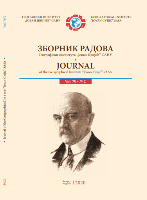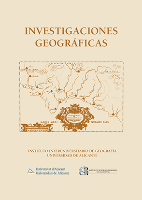
Miscellanea Geographica
Scope & Guideline
Bridging Theory and Practice in Earth Sciences
Introduction
Aims and Scopes
- Interdisciplinary Geography:
The journal integrates various sub-disciplines of geography, including human geography, physical geography, environmental science, and urban studies, fostering a holistic understanding of geographical phenomena. - Regional Studies:
A significant focus on regional studies, particularly in Central and Eastern Europe, examining local development, environmental changes, and socio-economic factors affecting specific regions. - Methodological Innovations:
Utilization of advanced methodologies such as remote sensing, machine learning, and text mining to enhance geographical research and provide new insights into spatial dynamics. - Cultural and Historical Geography:
Exploration of cultural and historical dimensions of geography, including the impact of historical events on current geographical landscapes and the role of cultural memory in urban environments. - Environmental and Climate Research:
Research on environmental changes, climate variability, and their implications for natural and human systems, focusing on both local and global scales.
Trending and Emerging
- Urban Resilience and Memory:
Emerging studies on urban environments are increasingly focusing on the concept of resilience, particularly how cultural memory and local identity shape urban experiences and responses to environmental changes. - Climate Change Adaptation Strategies:
There is a growing emphasis on research that explores adaptation strategies to climate change, particularly in relation to local governance and community resilience. - Geospatial Technologies and Big Data:
An increase in the use of geospatial technologies and big data analytics, including machine learning and remote sensing, is evident, reflecting a trend towards data-driven geographical research. - Sustainable Development in Tourism:
Research on sustainable tourism development is gaining traction, with a focus on balancing economic growth with environmental conservation and community engagement. - Cultural Geography and Identity Politics:
An emerging focus on cultural geography, particularly how identity politics influence geographical spaces and local development, is becoming more prominent in recent publications.
Declining or Waning
- Traditional Land Use Studies:
There has been a noticeable decrease in studies focused solely on traditional land use practices, possibly due to a shift towards more integrated approaches that combine socio-economic and environmental factors. - Historical Geography without Contemporary Relevance:
Research that examines historical geographical aspects without connecting them to contemporary issues appears to be waning, as the journal increasingly emphasizes relevance to current challenges. - Purely Theoretical Frameworks:
The journal has moved away from papers that rely heavily on theoretical frameworks without empirical data, favoring studies that offer practical insights and applications.
Similar Journals

Quaestiones Geographicae
Bridging Disciplines for a Deeper Understanding of GeographyQuaestiones Geographicae, an esteemed open-access journal published by SCIENDO, serves as a vital platform for scholarly communication in the field of Earth and Planetary Sciences. Since its inception in 1979, the journal has been dedicated to promoting rigorous research and discourse in geography, encompassing a breadth of topics that reflect the dynamic nature of the discipline. With an impressive Impact Factor belonging to the Q3 quartile category, the journal actively contributes to the global scientific community's understanding of geographical phenomena. Its commitment to open-access publishing since 2010 ensures that groundbreaking research is accessible to a wider audience, facilitating collaboration and innovation. As part of its enduring legacy, Quaestiones Geographicae engages researchers, professionals, and students alike, inviting them to explore, share, and expand the boundaries of geographical knowledge.

GEOJOURNAL
Exploring the Dynamics of Geography and DevelopmentGEOJOURNAL, published by SPRINGER, is a distinguished academic journal that occupies a pivotal role in the fields of geography, planning, and development. With a robust ISSN of 0343-2521 and an E-ISSN of 1572-9893, it has been a cornerstone of scholarly communication since its inception in 1977. Operating from the Netherlands, GEOJOURNAL offers insightful research articles that delve into the dynamics of spatial analysis, environmental management, urban studies, and regional development, thus catering to a diverse readership of researchers, professionals, and students alike. The journal boasts an impressive Scopus ranking of #176 out of 821 in its category, positioning it in the top 22% percentile while maintaining a Q2 quartile ranking in Geography, Planning, and Development as of 2023. With access options available, GEOJOURNAL remains a vital platform for disseminating cutting-edge research and fostering academic collaboration, indispensable for those engaging with contemporary geographic challenges and innovative solutions. Engage with GEOJOURNAL to enrich your understanding and contribute to critical discussions in this ever-evolving field.

Journal of the Geographical Institute Jovan Cvijic SASA
Fostering interdisciplinary dialogue in geography and beyond.The Journal of the Geographical Institute Jovan Cvijic SASA is a premier academic publication dedicated to advancing research and knowledge in diverse fields such as Demography, Earth-Surface Processes, Geography, Geology, and Tourism. Published by the Geographical Institute Jovan Cvijic SASA in Serbia, this Open Access journal has made significant contributions to the academic community since its inception in 1951, allowing for unrestricted dissemination of research findings globally. With an impact factor reflected in its 2023 Q3 quartile rankings across several categories, the journal underlines its relevance by maintaining a significant standing in the Social Sciences and Earth and Planetary Sciences domains, demonstrating engagement at a global level evidenced by its Scopus rankings. The journal's commitment to publishing high-quality, peer-reviewed articles makes it an essential resource for researchers, professionals, and students seeking to explore and enhance their understanding of geographical and environmental dynamics.

Investigaciones Geograficas-Spain
Connecting global insights through open access research.Investigaciones Geográficas-Spain is an esteemed academic journal published by the Universidad de Alicante, dedicated to advancing the fields of geography, planning, and development as well as earth and planetary sciences. With its commitment to open access since 1983, the journal ensures that research is readily available to a global audience, facilitating knowledge dissemination and collaborative discourse. As reflected in its 2023 Scopus rankings, it holds a commendable position within the Q3 category in both Earth and Planetary Sciences and Geography, Planning and Development, making it a noteworthy resource for scholars and practitioners in these disciplines. The journal's scope encompasses diverse geographical research, aiming to address pressing environmental and societal challenges through empirical studies and theoretical advancements. By contributing to the knowledge reservoir from Spain and beyond, Investigaciones Geográficas-Spain serves as a vital platform for researchers, professionals, and students seeking to enrich their understanding of geographical phenomena.

Geografie
Advancing geographical knowledge for a sustainable future.Geografie, published by the Czech Geographic Society, serves as a vital resource in the fields of geography, planning, and development. With an E-ISSN of 1212-0014, this esteemed journal has been contributing to the academic landscape since its inception in 1992, providing a platform for rigorous research and diverse perspectives on earth-surface processes and regional development issues. Based in the heart of Prague at Charles University, it has reached an impressive convergence of scholarly excellence, ranking in the Q3 category for both Earth-Surface Processes and Geography, Planning and Development as of 2023. Although it does not currently offer open access, the journal is indexed in Scopus, holding significant positions within its realms—392nd out of 821 in Social Sciences and 89th out of 179 in Earth and Planetary Sciences—indicating its relevance and contribution to ongoing discussions in both disciplines. As an indispensable tool for researchers, professionals, and students alike, Geografie not only enhances the understanding of spatial processes but also fosters innovative solutions for contemporary geographical challenges.

Entorno Geografico
Unlocking the Secrets of Our Planet's DynamicsEntorno Geográfico is a premier open-access journal published by University of Valle, dedicated to the field of geography and environmental studies. Since its inception in 2002, this journal has provided a dynamic platform for researchers, professionals, and students to disseminate innovative findings and engage in critical discussions regarding geographical phenomena and environmental challenges. With an ISSN of 1692-0074 and an E-ISSN of 2382-3518, it is recognized for its commitment to high-quality peer-reviewed content that reflects cutting-edge research trends within the discipline. The journal aims to enhance understanding of socio-environmental processes and contribute to the formulation of sustainable solutions to pressing geographical issues. By fostering an open-access model, Entorno Geográfico ensures that valuable knowledge is widely accessible, encouraging collaboration and advancing education in the field. Located in Cali, Colombia, the journal reflects a strong regional focus while embracing a global perspective, making it an essential resource for the international geography community.

GEOGRAFICKY CASOPIS-Geographical Journal
Exploring the dynamic relationship between earth and society.GEOGRAFICKY CASOPIS-Geographical Journal is a prestigious publication dedicated to advancing knowledge in the fields of geography and earth sciences, published by the SLOVAK ACADEMY OF SCIENCES, INSTITUTE OF GEOGRAPHY. With a rich history dating back to its inception in 1976, the journal serves as a vital forum for researchers and professionals to disseminate their findings across a range of topics including earth-surface processes, geography, planning, development, and geology. Notably, it maintains a respectable Q3 category ranking across these disciplines as of 2023, indicating its contribution to relevant academic discourse. The journal is indexed under critical databases and engages a global audience, making it an essential resource for scholars seeking to stay informed about contemporary issues and advancements in geography. Although currently not an open-access journal, it emphasizes the sharing of significant research findings and encourages submissions from various geographical contexts to enrich the scientific community. Geographical Journal's commitment to fostering interdisciplinary dialogue ensures its relevance and importance in shaping the future of geographical research.

Hungarian Geographical Bulletin
Empowering knowledge exchange in geography and beyond.Hungarian Geographical Bulletin, with ISSN 2064-5031 and E-ISSN 2064-5147, is a premier open-access journal published by the CSFK GEOGRAPHICAL INSTITUTE that has been an influential resource since 2009, dedicated to advancing the fields of geography, cultural studies, and agronomy. Located in Budapest, Hungary, this journal aims to disseminate high-quality research and engage a diverse audience of researchers, professionals, and students. The journal's reputation is underscored by its impressive category quartiles in 2023, ranking Q2 in Agronomy and Crop Science, Q1 in Cultural Studies, and Q2 across several other areas, including Geography and Earth and Planetary Sciences. With a Scopus ranking that places it in the top percentiles in multiple fields, the Hungarian Geographical Bulletin serves as an essential platform for innovative ideas and discussions that drive geographical scholarship and practice forward, specifically during its converged years from 2014 to 2024. Whether you are a seasoned researcher or an enthusiastic student, this journal presents a wealth of knowledge that is easily accessible due to its open-access format.

Revista Geoaraguaia
Navigating the Complexities of Human and Social SciencesRevista Geoaraguaia, published by UNIV FEDERAL MATO GROSSO, is an esteemed open-access journal dedicated to advancing research in the field of human and social sciences. Based in Brazil, this journal facilitates scholarly communication and fosters interdisciplinary approaches, exploring topics that encompass geography, sociology, and environmental studies. Although specific metrics like H-Index and impact factor are not listed, the journal is committed to providing a platform for innovative research that addresses pressing societal challenges. Researchers, academics, and students will find a rich repository of articles that not only contribute to theoretical frameworks but also enhance practical applications in various settings. By connecting local and global issues, Revista Geoaraguaia plays a crucial role in promoting academic discourse and advancing knowledge in the vibrant landscape of Latin American studies.

Annals of the American Association of Geographers
Navigating the Intersections of Geography and SocietyAnnals of the American Association of Geographers is a leading academic journal published by Routledge Journals, Taylor & Francis Ltd, and is based in the United Kingdom. With an impact factor positioning it in the Q1 category for both Earth-Surface Processes and Geography, Planning and Development, it stands as a pivotal resource for researchers and professionals in the fields of geography and environmental sciences. The journal’s broad scope accommodates a diverse range of topics, including spatial analysis, environmental change, and human geography, reflecting the dynamic nature of geographical research. Accessible in both print and digital formats, the journal encourages open dialogue and dissemination of knowledge among its authors, readers, and the academic community. As it converges through the years from 2016 to 2024, the Annals continues to showcase high-quality research that influences geographic thought and practice, making it essential reading for students, academics, and practitioners alike.